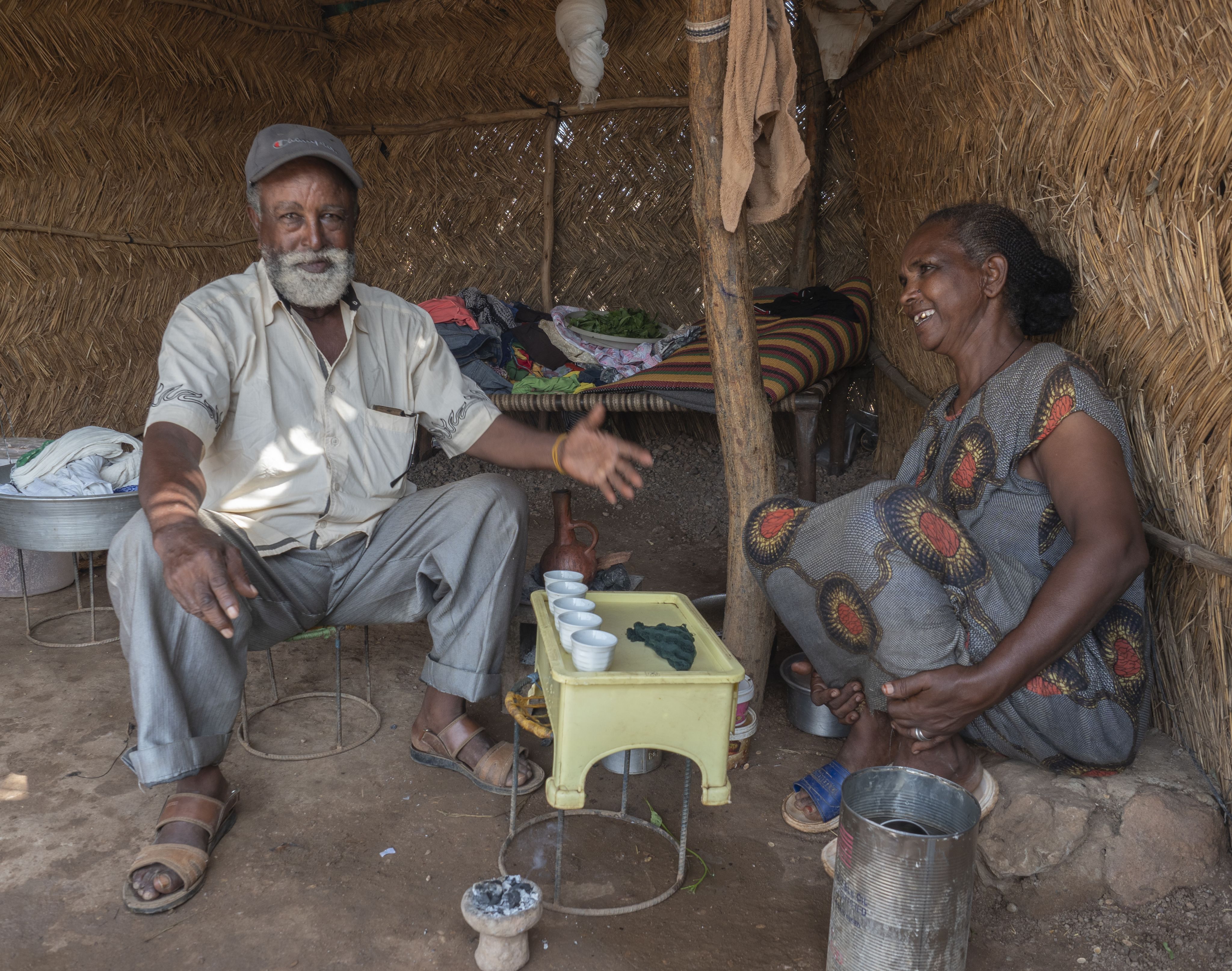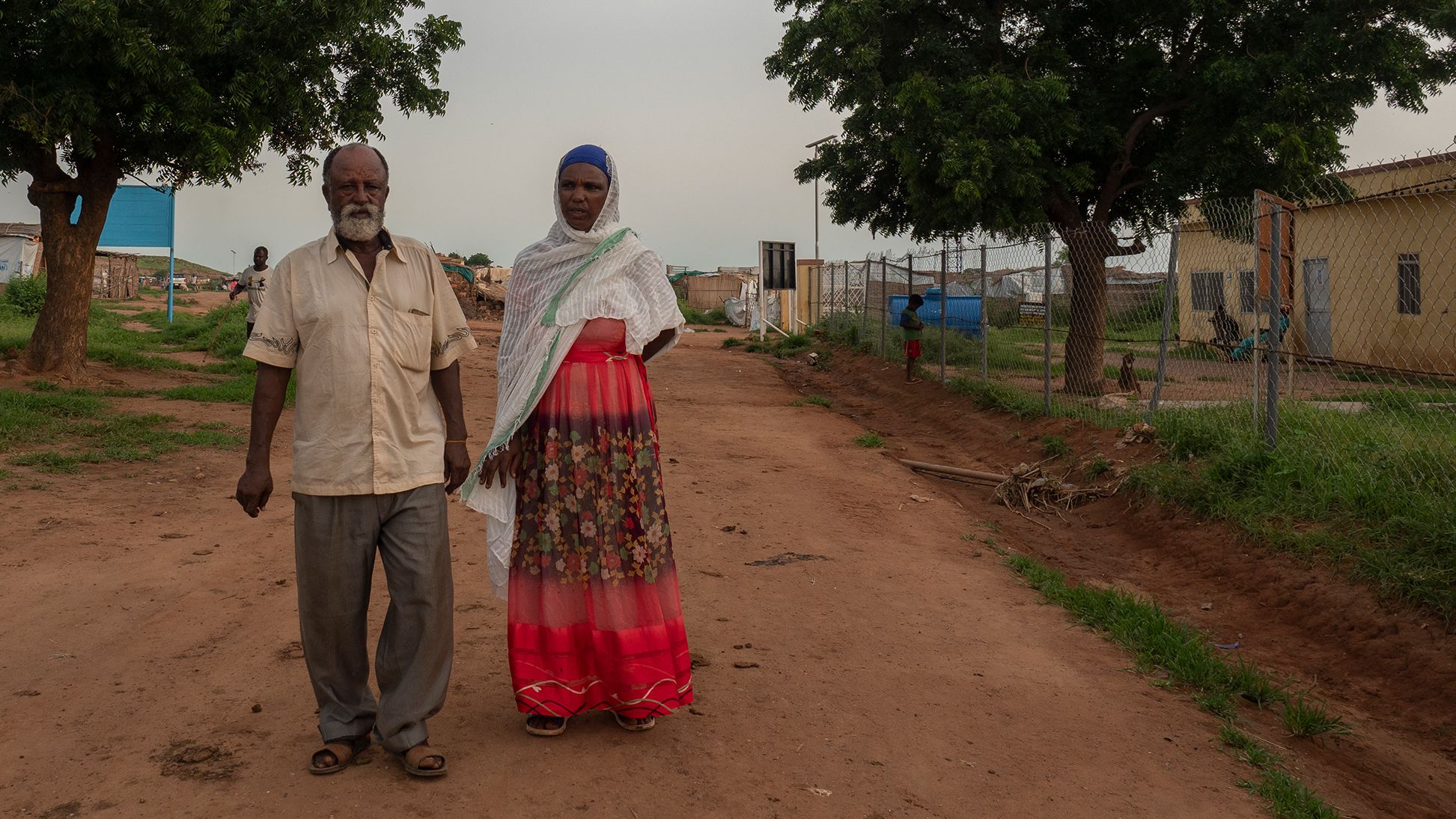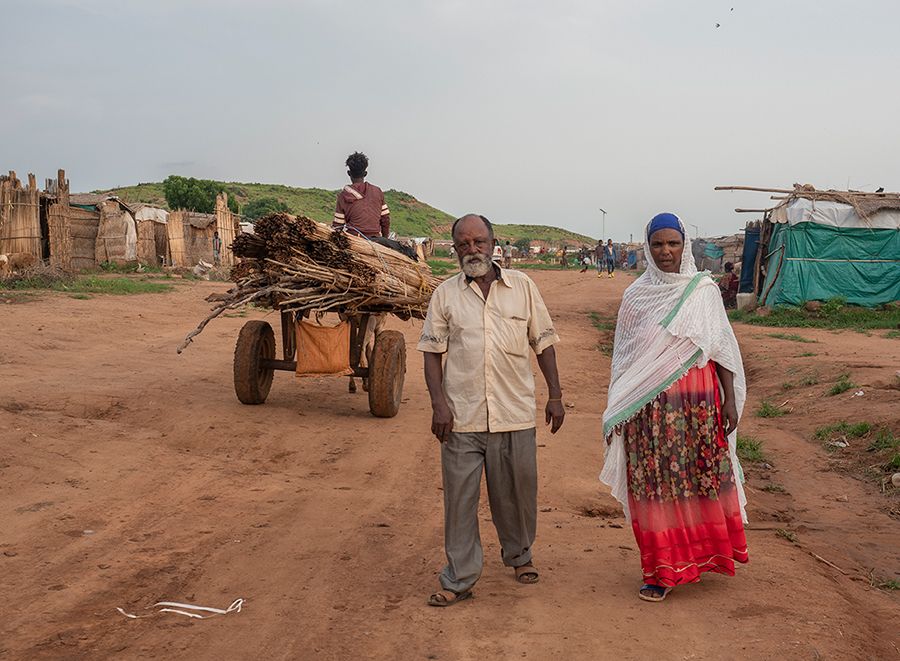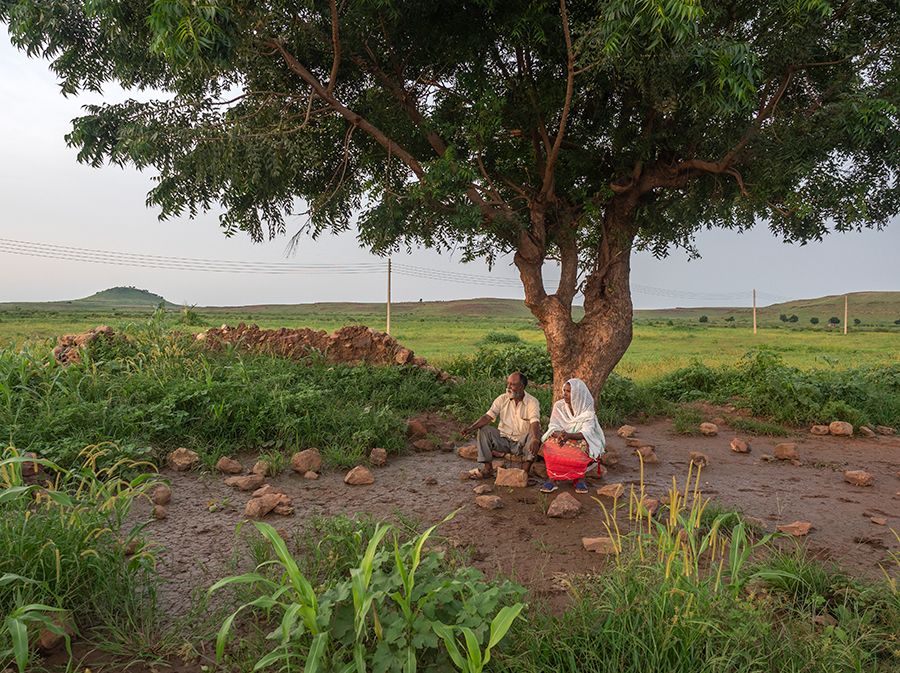Lifelong love:
“What’s the secret?”

“I saw her and wondered who she was. Right then and there, I swore that we would get married and that I would never leave her.”
When he was 26, Negasi was out on the football pitch. A father passed by with his two daughters. One of them was Zamam.
Negasi was in no doubt: this was the woman he was going to grow old with. Fully determined, he went home to his mother and said: “Aren’t you the one who is always insisting that I must have a wife? Well, I saw her today. And if she marries me, everything will be fine.”
“Hey, come on, laugh a little…? Please?”
…
“Come on.”
“Hahaha.”
“Noooo, I mean a real laugh!”
Over 40 years later, the two are still together. Negasi and Zamam.
They have been through seven births, and doubtless innumerable runny little noses, scraped knees, busy mornings with coffee for mum and dad – and thousands of quiet evenings in each other’s company.
Negasi and Zamam married in 1981. The following year their firstborn arrived – a son. Eventually two more children came, then four more.
“Do you want me to call you Brutukan, Zamam? You can call me Negie, for example, or just Negasi. You can call me Father Negasi!”
“Okay …”
“Then I’ll call you Situya.”
“Yes, I’ll call you that from now on.”
“Hmm … or ... her sweet name is Zemie. No, you know, we don’t really have any nicknames.”
For Negasi and Zamam, the last 40 years have been a circle of hope, love and hard work.
Now they are sitting outside their hut, in the dust of a refugee camp in Sudan. You can hear the sound of a baby crying in the background. Some boys are carrying buckets of water as they wander past. Negasi, who always wears the same grey shirt, runs in to change when he hears that we are also going to film.

Negasi and Zamam offer coffee in their hut.
Negasi and Zamam offer coffee in their hut.
Gathering the family
Negasi and Zaman have some of their children and grandchildren with them in the camp. The youngest always stays close to grandma and grandpa.

“We usually talk about life in the morning, Zamam and I, while she makes coffee. I say when it’s good and when it’s not. Like today … today the coffee was not good. It was so sweet. As a rule, the coffee is good, but not today.
... Anyway, we tend to discuss things while she’s making coffee. ‘What are we going to have for lunch today, dear? Have the children had something to eat? Should we buy some meat – or beans?’ Things like that.
What do you like to talk about, Zamam, while making coffee?”
“Serious things.”
For Zamam and her daughter-in-law, the day starts early. Even the rooster is still sleeping when they get up.
They have made a traditional Ethiopian oven, and together they bake bread for all the day’s meals. The extended family eats together.

Negasi has set up a small shop in their hut. In the kitchen, there is a long cable for people to come and charge their phones. He has also bought a freezer, so he can sell cold soft drinks to those who come by.
A small group of boys are chatting in front of a TV humming in the corner. They are watching a football match. Zamam runs the shop when Negasi is not there.
“We have no problems. We are good together. We don’t get tired of each other.”
“Well, unless she doesn’t listen to me, or I don’t do as she says. Then we have a problem.”
Negasi and Zamam say that honesty is important. They say what they mean. Because they listen to one another, they love each other even more.
“We had children, and created a family. Now we are old. What does it really mean, to like or dislike, when you have grown old? We have coordinated with each other for over 40 years.”
“Maybe she’ll die, or maybe I’ll die. That will be the only reason why we would part ways.”
“Why else would we ever do that? In our love, there is no fighting,” Negasi says.
"You have to support each other"
Negasi finds solace in having his family around him.
He is proud of his long history with Zamam. It’s good to have someone to lean on. Zamam agrees.
“We support each other. You have to. You must support each other in both good times and bad.”

“We never want to part ways, we wouldn’t want that. Why in the world would we do that after living together for more than 40 years? Our personalities fit each other, and unless God separates us, we will remain together.”
Negasi looks at his wife.
“We have peaceful lives. She loves me and I love her. We have our children alive and close to us. We have been together until now. The rest is up to God.”
“We have been married for 41 years, but 41 is not really that much. Others live until they are 88 years old, 90 years old. 41 is not so much, so we have to live a little longer.”
“What’s the secret? You just stay.”
Displaced together

When Negasi and Zamam met, they had both fled their home country of Ethiopia. They were living in a refugee camp in Gadarif, Sudan.
At that time, Negasi was working in a clinic in the camp, a job he had for about 18 years. Then, in 1994, came the news that the war was over.
“The organisation I worked for offered to send me to the United States. There were 30 of us who were supposed to go. All my colleagues chose the United States,” says Negasi. But he took his family home to Ethiopia – after almost 20 years of being displaced.
For the next 27 years, they tried to create a new life – in a country that had begun to feel foreign after so many years away. Little by little, they built a life together once again.
Negasi received land from the authorities and became what the Ethiopians refer to as an “investor.” He owned a farm and nearly 50 acres of land. The farm had several employees, and they had 400 or 500 sheep. “We had a good life,” says Negasi.
He and Zamam had just become used to life as grandparents when their lives were turned upside down again.
Back in Sudan
In November 2020, a conflict broke out in Tigray, Ethiopia. More than 60,000 people had to leave everything and flee across the border into Sudan.
Many still remain and are threatened by both violence and widespread hunger.

Negasi and Zamam in the camp in Sudan.
Negasi and Zamam in the camp in Sudan.
Now, Negasi and Zamam have been displaced again. They are back in Sudan, where they met over 40 years ago.
They didn’t have time to pack when they were forced to flee, they say. They had to leave everything behind. Even the sheep had to stay.
“Also our house – we left without locking the door. The TV was still on.”
The family was told by some friends that they had to leave, otherwise they would be killed. Negasi and Zamam left that same evening, with only the clothes on their backs, and ventured out into the water.
“When we came here, we came like this. We crossed the river, holding hands.”
“We came here, and now we have slept on this floor for a month or two.”
“I’m not worried about myself, because I’ve been through all this before,” Negasi says.
“I grew up during a war. I know what I have to do. But I’m worried about my family. They’ve never experienced anything like this before.”

The couple are back in the camp in Sudan, where their story started.
The couple are back in the camp in Sudan, where their story started.
Negasi and Zamam dream of being able to return home again. Negasi says that he left his old uniform behind when they had to flee. It’s in a box in their home. When they are finally home again, he says, he will put on his uniform and take a picture and send it to us.
Zaman tells us that they hope life for their large family one day will be the same as it was before, that their children and grandchildren will be allowed to return to their homeland, to Ethiopia.
Negasi agrees: “We want them to learn, to complete their education. Get a job. They have not been to school for two years now. First, the coronavirus pandemic kept them away for a year, then we had to flee here, and now they are just sitting here...”
Negasi and Zamam are nevertheless happy that their family is safe. They will manage this together – again.
“There is nothing you can’t manage,” says Zamam. “You get through difficult times. We feel for those who are still having a hard time.”
“For us, it’s easier now.”

